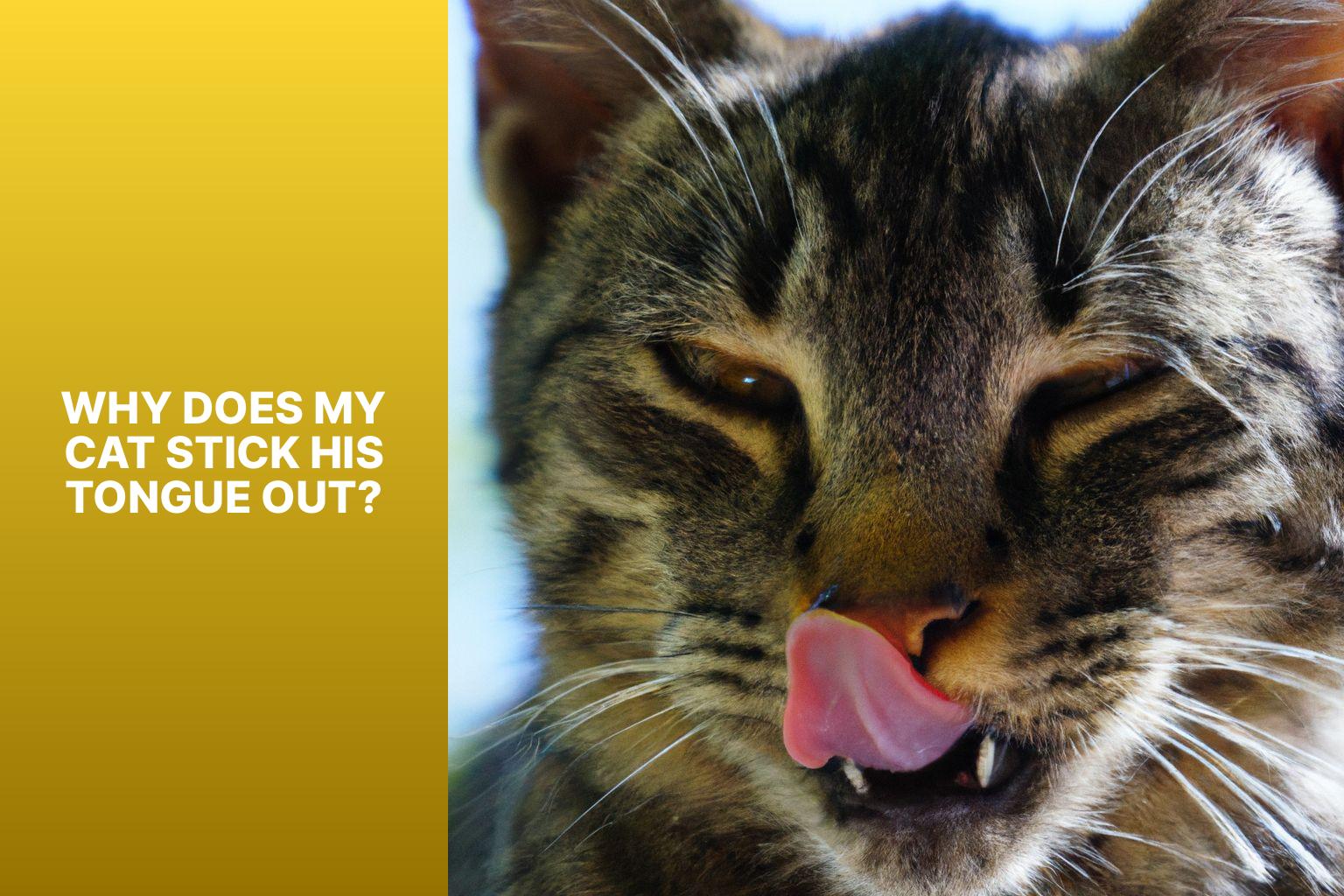Cats are known for their unique behaviors, and one peculiar habit that many cat owners may notice is their cat sticking their tongue out. While it may seem unusual or concerning, there are actually several reasons why cats exhibit this behavior. Understanding why your cat sticks their tongue out can help you determine whether it’s a normal occurrence or if there may be an underlying issue that needs to be addressed.
Common reasons for cats sticking their tongue out include:
- Heat Regulation: Cats don’t sweat like humans do, so sticking their tongue out helps them cool down by evaporating moisture from their mouth.
- Panting: Similar to dogs, cats may pant to regulate their body temperature, especially after exertion or during periods of stress.
- Dental Issues: Dental problems, such as tooth decay or gum disease, can cause discomfort or pain, leading to a cat sticking their tongue out.
- Respiratory Problems: Respiratory conditions, such as asthma or allergies, can make it difficult for a cat to breathe through their nose, causing them to breathe through their mouth and stick their tongue out.
- Nausea or Upset Stomach: Cats may stick their tongue out if they’re feeling nauseous or have an upset stomach, as it can help alleviate the discomfort.
While occasional tongue sticking is usually not a cause for concern, there are situations where you should be vigilant. If your cat’s tongue sticking becomes excessive, is accompanied by other concerning symptoms, or seems to distress your cat, it’s important to consult your veterinarian.
To address the issue, your veterinarian will need to evaluate your cat’s overall health and determine the underlying cause. Depending on the diagnosis, they may recommend specific treatments or lifestyle changes to alleviate the issue.
Preventing tongue issues in cats can be done through regular veterinary check-ups, proper dental care, creating a stress-free environment, and avoiding harmful substances that can lead to health problems.
By understanding the reasons behind your cat’s tongue sticking behavior and seeking appropriate advice when needed, you can ensure the well-being and comfort of your feline companion.
Key takeaway:
- Heat regulation: Cats may stick their tongues out as a way to regulate their body temperature, especially in hot weather.
- Panting: Panting can occur in cats when they are overheated or experiencing physical exertion.
- Dental issues: Dental problems can cause cats to stick their tongues out, indicating pain or discomfort in their mouths.
Why Does My Cat Stick His Tongue Out?
Photo Credits: Www.Catcornerblog.Com by Matthew Martinez
Why Does My Cat Stick His Tongue Out?
Cats stick their tongues out for a few reasons.
- Cleaning: Cats use their rough tongues to clean their fur by removing dirt and loose hair, keeping themselves clean and maintaining hygiene.
- Cooling off: Cats regulate their body temperature by panting, since they don’t have sweat glands like humans. Sticking their tongues out helps them cool down.
- Taste testing: Cats have a highly developed sense of smell and taste. Sticking their tongues out helps them gather more information about their surroundings by tasting the air or objects.
- Relaxation: Some relaxed cats stick their tongues out as a sign of contentment and to show that they feel safe and comfortable in their environment.
Remember, if you see your cat sticking its tongue out, it’s completely normal behavior for them. Cats have their own unique ways of communicating and taking care of themselves.
Common Reasons for Cats Sticking Their Tongue Out
Curious about why your feline friend occasionally sticks their tongue out? Let’s explore the common reasons behind this adorable behavior. From heat regulation to dental issues, panting to respiratory problems, and even feelings of nausea or an upset stomach, there are various factors that could be causing your cat’s tongue to make an appearance. Get ready to uncover the fascinating insights behind your kitty’s tongue-related antics!
Heat Regulation
Heat regulation is crucial for cats. One way they regulate their body temperature is by extending their tongues. When cats stick their tongues out, it aids in cooling them down because their tongue is equipped with sweat glands that evaporate moisture and release heat. This behavior is common in periods of high temperatures or after physical exertion.
On hot days, cats extend their tongues to increase airflow and promote evaporation, which ultimately cools down their bodies. The moist surface of their tongue helps dissipate heat and restore their body temperature to normal levels. This is of utmost importance as cats are susceptible to overheating, which can lead to heatstroke and other health complications.
To assist with heat regulation, ensure your cat has access to a cool and comfortable environment. Make sure there is an ample supply of fresh water available, and keep them indoors during the hottest parts of the day to prevent overheating.
A true anecdote exemplifies the significance of heat regulation in cats. One summer day, I discovered my own cat, Luna, sitting on the bathroom floor with her tongue slightly extended. Worried about her well-being, I immediately provided her with cool water and placed a nearby fan to improve air circulation. Within minutes, Luna retracted her tongue as she began to cool down. It served as a reminder of how imperative it is to assist cats in regulating their body temperature, especially during hot weather conditions.
Panting
Panting in cats can indicate health issues and some normal behaviors. Here are possible causes of panting in cats:
1. Heat regulation: Cats may pant to cool down in hot weather or warm environments.
2. Stress or anxiety: Panting can be a sign of stress or anxiety in cats.
3. Respiratory problems: Panting can be a symptom of respiratory problems like asthma or bronchitis.
4. Heart issues: Cats with heart problems may pant due to difficulty breathing, accompanied by symptoms like coughing, lethargy, or decreased appetite.
5. Pain or discomfort: Cats may pant when in pain or experiencing discomfort due to injuries, dental issues, or other health conditions.
If unsure of the cause, consult with a veterinarian for proper diagnosis and treatment. In the meantime, create a calm environment, provide fresh water, and a comfortable resting area for your cat.
Dental Issues
Dental issues can cause a cat to stick their tongue out. Cats can experience a range of dental problems that directly impact their oral health and result in discomfort. Tooth decay, periodontal disease, broken teeth, oral trauma, oral tumors, and tooth resorption are some examples of dental issues that can contribute to a cat sticking their tongue out. Unfortunately, these conditions bring about pain, inflammation, and nerve exposure, ultimately making it difficult for the cat to keep their tongue inside their mouth.
In order to prevent dental issues in cats, regular oral healthcare is crucial. This includes scheduling regular vet check-ups to evaluate the cat’s oral health, engaging in dental care practices such as brushing their teeth or offering dental treats, and providing a well-balanced diet that supports oral health. It is important to be aware that cats may conceal signs of dental pain, so it’s essential to be attentive to any behavioral changes, such as sticking their tongue out, and promptly seek veterinary care if any concerns arise.
To illustrate the significance of dental care, consider the experience of one cat owner who noticed her cat, Whiskers, frequently sticking his tongue out. Worried about his well-being, she took him to see a vet. Upon examination, the vet discovered that Whiskers had developed severe dental disease. His teeth were decayed, and he was suffering from gum disease, which caused discomfort. The vet administered cleaning and extractions to enhance Whiskers’ oral health. Following the treatment, Whiskers ceased sticking his tongue out and appeared to be more at ease. The cat owner gained an understanding of the importance of dental care and made a commitment to regular veterinary check-ups and proper dental hygiene. Consequently, Whiskers continued to relish a healthy and contented life, devoid of dental discomfort.
Respiratory Problems
Respiratory problems in cats can be a sign of an underlying health issue. Common respiratory issues in cats include nasal congestion, sneezing, coughing, and difficulty breathing. These problems can be caused by infections, allergies, or anatomical abnormalities.
If your cat is experiencing respiratory problems, it is important to seek veterinary attention. The veterinarian will perform an examination and may recommend diagnostic tests, such as X-rays or blood work, to determine the cause of the issue.
The treatment for respiratory problems will depend on the specific diagnosis. It may involve the use of medications to alleviate symptoms and treat any infections, as well as the management of any underlying health conditions. Lifestyle adjustments, such as removing allergens from the cat’s environment or improving home ventilation, may also be necessary.
Prevention is crucial in order to avoid respiratory problems in cats. It is important to maintain good oral hygiene and provide regular dental care to prevent dental disease. Keeping the cat’s environment clean and free from irritants is essential.
Nausea or Upset Stomach
When a cat sticks their tongue out, it may indicate nausea or an upset stomach. Here are some possible causes for these symptoms:
– Change in diet: A sudden change in cat food can lead to an upset stomach and nausea. Introduce new foods gradually to avoid digestive issues.
– Food intolerance: Cats can develop intolerances or allergies to certain ingredients in their food, causing digestive discomfort and nausea.
– Ingestion of foreign objects: Cats’ curious nature can lead them to ingest objects that irritate their stomach, such as hairballs, string, or small household items.
– Gastrointestinal infections: Viral or bacterial infections in the gastrointestinal tract can cause nausea and upset stomach. Cats can contract these infections from contaminated food or water sources.
To help alleviate your cat’s nausea or upset stomach, consider the following suggestions:
– Provide a bland diet: Offer a small amount of plain, cooked chicken or boiled white rice to soothe their stomach.
– Keep them hydrated: Ensure your cat has access to fresh water to prevent dehydration.
– Consult with a veterinarian: If your cat’s symptoms persist or worsen, seek professional advice. A veterinarian can determine the underlying cause and provide appropriate treatment.
By paying attention to your cat’s symptoms and providing proper care, you can help alleviate their nausea or upset stomach and ensure their overall well-being.
When Should I Be Concerned?
When should I be concerned? When your cat sticks its tongue out, there are situations that should raise concern. Be proactive and attentive to your cat’s behavior. If your cat sticks its tongue out excessively or for prolonged periods, it could indicate an underlying health issue. Notice any abnormalities like drooling, difficulty eating or drinking, or changes in appetite or behavior.
Another cause for concern is if your cat’s tongue sticking out is accompanied by other symptoms such as vomiting, diarrhea, or lethargy. These could be indicators of a more serious condition requiring veterinary attention.
When determining whether to be concerned, consider the frequency and severity of the behavior. Occasional tongue sticking out during grooming or after drinking water is usually normal. If it becomes a persistent or compulsive action, it may indicate a problem.
Ultimately, trust your instincts as a pet owner. If you feel something is not right, consult with a veterinarian. They can assess your cat’s health and provide appropriate guidance and treatment if necessary. Always prioritize your cat’s well-being.
What Should I Do if My Cat Keeps Sticking His Tongue Out?
If your cat keeps sticking his tongue out, it is important to observe his behavior for signs of discomfort. Consult a veterinarian to rule out any potential medical conditions.
It is also important to keep fresh water available at all times to hydrate his mouth and reduce the urge to stick out his tongue. Regularly brushing his teeth can help prevent oral issues.
When your cat sticks out his tongue, try distracting him with interactive play or puzzle toys. Using positive reinforcement training, reward your cat when he refrains from sticking out his tongue.
Remember that every cat is unique, so be patient in finding the most effective solution. If the behavior continues or worsens, it is advisable to consult a feline behaviorist for tailored advice.
Preventing Tongue Issues in Cats
Preventing tongue issues in cats is crucial for their overall health and well-being. In this section, we’ll explore effective ways to ensure your feline friend’s tongue remains in tip-top shape. From regular veterinary check-ups to proper dental care, creating a stress-free environment, and avoiding harmful substances, we’ll cover it all. So, grab a seat and let’s dive into the essential measures to maintain a healthy and happy tongue for your beloved cat.
Regular Veterinary Check-ups
Regular veterinary check-ups are essential for maintaining your cat’s health. During these visits, your veterinarian can assess your cat’s health, identify potential issues, and provide preventative care. Check-ups allow your veterinarian to monitor your cat’s weight, dental health, and vaccination status. They can also perform routine blood work to check for underlying health conditions, such as kidney or liver disease. Addressing these issues early can prevent them from becoming more serious problems.
Regular check-ups ensure your cat’s vaccinations are up to date, protecting them from life-threatening diseases. Your veterinarian can also give guidance on nutrition, behavior, and parasite prevention. To maintain your cat’s health, schedule yearly check-ups for adult cats, and more frequent visits for senior cats or those with pre-existing conditions. Follow your veterinarian’s recommendations for check-up frequencies based on your cat’s needs. Prioritizing regular veterinary check-ups ensures your cat remains healthy and happy. Don’t underestimate their importance in providing comprehensive care for your feline companion. Remember to consult your veterinarian for personalized advice on your cat’s healthcare needs.
Dental Care
Dental care is crucial for your cat’s health. Cats can have dental issues like tooth decay, gum disease, and tooth resorption. Regular dental care prevents these problems and keeps your cat’s teeth and gums healthy.
To take care of your cat’s dental health:
1. Schedule regular veterinary check-ups. Your vet will examine your cat’s dental health and provide necessary treatments or preventive measures.
2. Practice oral hygiene by brushing your cat’s teeth regularly using cat-specific toothpaste and a toothbrush. Introduce tooth brushing gradually and make it a positive experience for your cat.
3. Feed your cat a dental-friendly diet like dental care cat food or dental treats, which reduce plaque and tartar buildup.
4. Professional dental cleanings may be necessary in some cases to remove tartar and address underlying dental issues. These cleanings are done under anesthesia.
One true story highlights the importance of dental care. Sarah, the owner of a cat named Lily, noticed that Lily was having difficulty eating and pawing at her mouth. Sarah took Lily to the vet and discovered severe gum disease and infected teeth. Lily needed dental extractions and antibiotics to treat the infection. With diligent dental care, Lily’s oral health improved, and she could enjoy her food again.
Environment and Stress Management
When it comes to managing your cat’s environment and stress, it is important to take into consideration the following factors:
1. Creating a calm and secure space for your cat to retreat to when they start feeling stressed is crucial.
2. It is important to identify and minimize stressors such as loud noises or any changes in the daily routine of your cat.
3. Engage your cat in enrichment activities like interactive toys and puzzles to keep them mentally stimulated.
4. Maintaining a consistent routine for feeding, playtime, and sleep plays a significant role in reducing stress levels.
5. Using calming techniques such as desensitization training or pheromone diffusers can be beneficial.
6. If your cat’s stress levels are consistently high or if you notice concerning behaviors, it is recommended to consult a veterinarian or an animal behaviorist.
By implementing these techniques, you can create a calm and content atmosphere for your cat, ensuring proper environment and stress management.
Avoiding Harmful Substances
Keep your cat safe by avoiding harmful substances. One way to do this is by keeping your cat away from toxic plants like lilies, daffodils, and tulips. It is important to store household cleaning products, pesticides, and other chemicals securely to prevent accidental ingestion. Never give your cat any medications without veterinary approval, and be sure to prevent them from accessing toxic foods like chocolate, onions, garlic, grapes, and raisins. Another step you can take is ensuring that your cat does not come into contact with antifreeze, rodent poisons, and other toxic substances commonly found outside. It is also important to create a smoke-free environment for your cat to protect their respiratory health. When choosing cat toys, make sure they are safe and non-toxic. Remember to store household cleaners securely and prevent your cat from accessing them. By taking these precautions and avoiding harmful substances, you can keep your cat healthy and safe.
Some Facts About Why Cats Stick Their Tongues Out:
- ✅ Cats may stick out their tongues to explore their surroundings and collect pheromones.
- ✅ Missing teeth can cause a cat’s tongue to hang out.
- ✅ Cats may stick out their tongues to please their owners if they receive positive reinforcement.
- ✅ Relaxed cats may let their tongues slip out naturally.
- ✅ Grooming can also cause a cat’s tongue to stick out.






